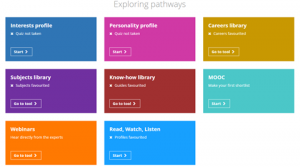(CEIAG) Careers Education Information Advice and Guidance
Our Careers Programme
In the recent Ofsted inspection report our Careers programme was described as “excellent” and “a key strength of the school”.
We are delighted to have received the Quality in Careers Award and are working towards the Gatsby Benchmarks. Our inspection by Inspiring IAG highlighted how “there is evidence of robust leadership and management of careers” whilst “raising aspirations is at the heart of the school’s approach to CEIAG.” “The school provides tailored support and intervention to those students who need it” and “career learning is planned and sequenced so that students develop their knowledge and skills.”
Our Careers programme runs from Year 7 to Year 13 and prepares students well for life after they leave the school. It has been designed to align with the eight Gatsby Benchmarks which have been recognised by the government as outlining the requirements of an excellent careers programme.
Students have many encounters with employers and learn about the different careers and the various routes into these careers. It helps students to find the careers that suit them and prepare them to follow their desired path. Students learn about the different work sectors and are taught to challenge the various stereotypes and discrimination that exists in the world of work. Students learn how to take responsibility for their own career by planning for the future. They learn how to create an effective CV and learn useful skills such as developing a professional and successful interview technique. The programme supports pupils through each of the transitions they face such as choosing Year 9 options and deciding what to do after Year 11 and after Year 13. Students have an experience of the workplace in year 9 and complete a week of work experience in Year 12.
Our Careers programme is comprised of the following:
- Students receive individual impartial advice from our Level 6 qualified Careers advisor who has been commissioned from a MATRIX accredited organisation (MPloy Solutions). Students identified as requiring extra support receive regular individual impartial advice from our advisor from Young People Services. Impartial and independent advice is given to students in accordance with the Statutory Guidance for Schools and Guidance for Colleges and Sixth Forms. It is organised and delivered in accordance with the Gatsby benchmarks and Compass tool. All students receive a one to one meeting in either Year 10 or Year 11 and also in 6th Form. Students identified as requiring an extra meeting are seen again. Students in any year can be referred for a Careers meeting. Any requests to see the Careers advisor should be made directly to the appropriate Year Leader.
- The Careers advisor is also present at the Parents’ Evenings for Years 9-13 as well as results day for Year 11 and 13.
- Careers lessons take place during form times with a new focus every half term from Year 7 to Year 13. Each lesson focus is matched at KS3 and at KS4 with the CDI (Careers Development Institute) framework for careers, employability and enterprise education and in line with Gatsby Benchmarks. Students will look at LORCID employability skills – leadership; organisation; resilience; communication; initiative and digital awareness.
- All students in each year group have a careers focused session in curriculum areas once a term and an hour session during transition points. One transition lesson takes place in Year 9 to help them with choosing their GCSE options and the other is delivered in in Year 12 to help them with their post Year 13 choices.
- All students set up a profile on Unifrog which they can access from Year 7 and use to record their experiences and help them to find the right career path.
- All students in our 6th Form continue to use Unifrog and use this online resource to complete and track many tasks such as recording skills and experiences, searching for degrees, writing a personal statement, completing UCAS applications, searching and applying for apprenticeships etc.
- Students have encounters with employers each year through talks from guest speakers in Mission days and assemblies in Years 7-13.
- Students have a Careers Day in Year 11 in which they will hear from external speakers and employers and carry out various careers related activities throughout the day including looking at all post 16 options including A Levels; T Levels; BTECs and apprenticeships. Students will then write a personalised plan for their post 16 plans.
- Students across all Year groups have contact with employers and further education through various school trips and guest speakers visiting lessons.
- Students participate in themed weeks as part of the pastoral curriculum including apprenticeship week and carers week.
- Students participate in STEM (Science, Technology, Engineering and Maths) activities in school which explores the jobs available and highlights the problem of the lack of women in this work sector.
- There is a 6th Form Welcome Day in Year 10 and in Year 11 where students will be able to attend A Level style lessons to get a feel of what it would be like to study in a 6th form.
- Students in Year 9 will participate in an experience of the workplace, working within a variety of different sectors and with local employers. They will complete project work and look at different routes into their selected employment sectors.
- Students attend a week of work experience in Year 12. Students are guided to help them to try to organise their own placements in job sectors of their choice. We support others to help them to find a place. All risk assessments are completed for all placements prior to commencing work experience.
- Students in Year 13 exploring non-university routes are invited to take part in the Employer Readiness Programme where students take part in a workshop on apprenticeships; a CV and interview skills workshop; 1:1 feedback from employers on their CV and a mock interview and a mock assessment centre with local employers.
Our Careers programme is evaluated every year. The next evaluation will take place in November 2022. We will review what is working well and will identify areas that require further development so that we can continue to improve our practice and further strengthen our Careers programme. An annual Careers report will be created and shared with governors.
We review all feedback from:
- Year 13 and Year 11 intention and destination data
- Feedback collected from students, staff, parents and employers after mission days
- Student voice of the pastoral curriculum
- Evaluation with our careers advisor
- Evaluation of work experience
- Feedback from our Compass review with an independent reviewer
- Feedback from the Quality in Careers Award
If you explore this Careers section of our website you will find lots of information, websites, videos and other resources to help you to find out how we support all students to find their own paths and prepare for their futures.




 Each department received a department resource pack including subject guides and posters. Each subject guide includes how your subject prepares students for work; reasons to choose your subject; case studies on job roles and business profiles; routes into different sectors including apprenticeships and university applications.
Each department received a department resource pack including subject guides and posters. Each subject guide includes how your subject prepares students for work; reasons to choose your subject; case studies on job roles and business profiles; routes into different sectors including apprenticeships and university applications.













